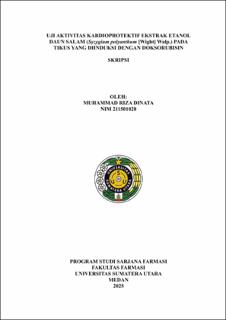| dc.description.abstract | Background: Cardiovascular disease is one of the leading causes of death globally, with doxorubicin being an effective antineoplastic agent but having significant cardiotoxicity side effects. The use of cardioprotective adjuvants is currently limited so safer alternatives are needed. Bay leaves (Syzygium polyanthum) are rich in flavonoids that have the potential as antioxidants to protect the heart from the toxic effects of doxorubicin.
Objective: This study aimed to examine the cardioprotective effect of ethanol extract of bay leaves (EEDS) on doxorubicin-induced rats
Methods: Experimental study was conducted using rats induced with 15 mg/kgBB doxorubicin for 14 days. EEDS was administered in different doses (100, 300, 500 mg/kgBB) and compared with negative control (CMC-Na 0.5%) and positive control (Vitamin E 100 mg/kgBB). Cardioprotective activity was tested through parameters, body weight, relative heart weight, histopathology, CK-MB, and cTnT.
Results: Administration of EEDS showed a significant difference in relative heart weight among treatment groups (p < 0.05). The doxorubicin (DOX) group exhibited the greatest decrease in relative heart weight, while high-dose EEDS (500 mg/kgBW) and Vitamin E maintained heart weight near normal levels. Cardiac biomarkers cTnT and CK-MB were significantly elevated in the DOX group compared to the normal, EEDS + DOX, and Vitamin E + DOX groups (p < 0.05). Co-administration of EEDS or Vitamin E significantly reduced these elevations. Histopathological analysis revealed necrosis in the cardiac tissue of the DOX group, whereas treatment with EEDS and Vitamin E preserved normal myocardial fiber structure. These findings indicate that EEDS exhibits cardioprotective effects against doxorubicin-induced cardiac damage.
Conclusion: The results of this study concluded that ethanol extract of bay leaves has cardioprotective activity that can improve relative heart weight, heart histopathology, cTnT and CK-MB levels | en_US |


